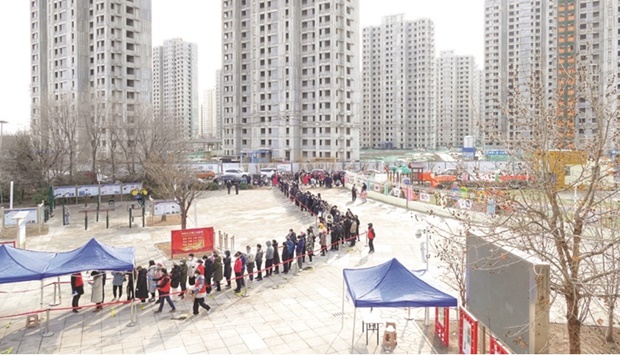The northern coastal city of Tianjin began testing its population of around 14mn yesterday after at least two local cases of the highly-transmissible coronavirus (Covid-19) Omicron variant were detected, state media reported.
Residents in four districts would be tested over the next 24 hours while other districts would be tested the next day, the Tianjin government said.
Residents will only get the green health code necessary to travel once they receive a negative result, it said.
The city advised residents not to leave town for unnecessary reasons, the government said late on Saturday.
So far no full lockdown order has been given.
The Tianjin outbreak poses risks to Beijing and the upcoming Winter Olympics, because of the large number of commuters working and living in the two cities, the state-owned Global Times said, citing an unnamed immunologist.
Commuters to Tianjin from Beijing have been asked to stay away, Xinhua reported.
It comes after local transmission of the imported Omicron variant was found in the southern city of Guangzhou, according to a national health official in December, though the number of cases was not disclosed.
China reported 165 confirmed coronavirus cases for January 8, up from 159 a day earlier, its health authority said yesterday.
Of the new infections, 92 were locally transmitted, according to a statement by the National Health Commission, from 95 a day earlier.
Most of the new local cases were in Henan and Shaanxi provinces.
China reported 46 new asymptomatic cases, which it classifies separately from confirmed cases, compared with 52 a day earlier.
There were no new fatalities, leaving the death toll at 4,636.
Mainland China had 103,619 confirmed cases as of January 8.
Chinese authorities have already been struggling with a larger outbreak centred on the northwestern city of Xi’an that has sparked questioning of the country’s zero-tolerance policy of strict lockdowns and immediate mass testing to curb outbreaks.
Xi’an, historic home to China’s famed Terracotta Warriors, was locked down last month, forcing its 13mn residents indoors.
New case numbers there have slowed in recent days.
Officials have faced complaints from Xi’an residents over chaotic handling of the lockdown, including poor access to food and daily essentials, and viral cases such as a miscarriage suffered by an eight-month pregnant woman who was refused entry to a hospital without a Covid-19 test.
Yesterday Beijing’s traffic management authority warned people to stay away from the special vehicles used to ferry people to and from the Winter Olympic venues in the event of a traffic incident.
Staff involved in the Winter Olympics will be kept in a “closed loop” operation and asked to avoid contact with those outside it, the Beijing Traffic Management Bureau said in a post on its Twitter-like Weibo account.
If there is an accident with one of the vehicles, people should maintain a safe distance, avoid contact with those inside and wait for professionals to arrive at the scene, the post said.
On Wednesday organisers said they had begun the “closed loop” operation, in which participants can only leave if they are exiting the country or undergo quarantine, to prevent an outbreak among Games participants from leaking into China’s public.
The 2022 Games open on February 4.
More than 2,000 international athletes are set to come to China for the Games, plus 25,000 other “stakeholders”, a large number from overseas.
Organisers did not say how many of those people would be in the closed loop.

People line up for nucleic acid testing during a citywide mass testing for the coronavirus (Covid-19) disease after local cases of the Omicron variant were detected in Tianjin.
